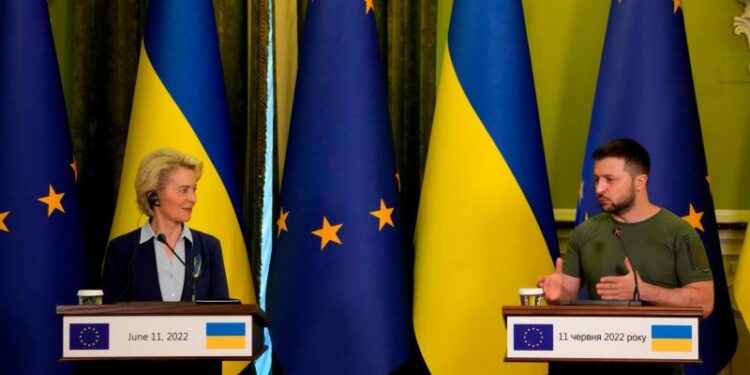Formal negotiations between Ukraine and Moldova on joining the European Union begin on Tuesday, a landmark moment for the two former Soviet-bloc countries that marks the start of a long, drawn-out process.
European Commission President Ursula von der Leyen said in a post on X: “Congratulations to Moldova and Ukraine on opening accession negotiations. This is very good news for the people of Ukraine, Moldova, and the entire European Union. The path ahead will be challenging but full of opportunities.”
The two nations first applied to join the EU in 2022, shortly after Russia launched its full-scale invasion of Ukraine. While the bloc has been broadly supportive of Ukraine and sent over $100 billion, according to EU figures, the path to joining the EU for either country will be far from smooth.
Hungary, Russia’s main ally within the EU, has dragged its feet on a number of issues concerning Ukraine, including military and financial aid. In December of last year, Hungarian Prime Minister Viktor Orban said he would block Kyiv’s bid to begin accession talks. He eventually dropped his objections, however, Orban will still have plenty of opportunities to frustrate Ukraine.
The path to EU membership requires candidate to meet a set of criteria before entering into detailed chapters of negotiation – known as the chapters of the acquis – covering a range of issues, from economic standards to rule of law. There are 35 chapters in total, all of which must be agreed by all negotiating parties, including the 27 EU member states. The process of opening, negotiating and closing all 35 chapters is expected to take over a decade for both Moldova and Ukraine.
Further to this, neither country has yet to meet the criteria to even reach this stage of the negotiations. Meeting the criteria is particularly complicated for Ukraine, as it is virtually impossible to meet the standards required while under invasion and at war.
Moldova, too has domestic difficulties, with the self-declared Moldovan independent state of Transnistria seeking alliance with Russia while the rest of the country turns to Europe. Transnistria is internationally still recognized as part of Moldova, but it is not implausible that some will see this as a reason the country cannot join the EU while the matter is unresolved.
Practical and technical negations aside, there is also a political dimension to this that is likely to complicate negations. Expanding the bloc to the east of Europe will have consequences for the rest of the EU member states. It is likely both Ukraine and Moldova will be net recipients of the EU budget. That makes it a harder sell for all the existing EU nations, as their spending will go up and their overall share of the budget will fall.
There will also be implications for industry. Ukraine, for example, has already run into trouble with European partners over its agricultural industry. Poland, one of the most consistent supporters of Ukraine in its war effort, temporarily banned Ukraine from exporting grain into the country because it was harming Polish farmers. The spat escalated, with Poland suspending its military support for Ukraine.
Perhaps more importantly, accepting Ukraine and Moldova to the bloc would mean adding around 40 million new EU citizens from Eastern Europe. This means giving freedom of movement within the bloc to many people who might want to escape what has recently been a war zone.
It would also shift the balance of power within the EU further to the east. While there are no hard and fast rules about which member states align on which issues, it is broadly reasonable to say that the eastern countries have different political views to southern and Western European countries.
That could mean some existing EU member states will slow down and frustrate the process unless certain safeguards are put in place protecting their own privileged positions within the bloc.
The start of negotiations is a big moment for those hoping to join the bloc to they can move further away from Russian influence and into the EU yolk. But in reality, these opening talks are mostly symbolic and there is still a long way to go before either country becomes a full member state.
Source link : https://amp.cnn.com/cnn/2024/06/25/europe/ukraine-moldova-eu-talks-intl
Author :
Publish date : 2024-06-25 11:32:00
Copyright for syndicated content belongs to the linked Source.


